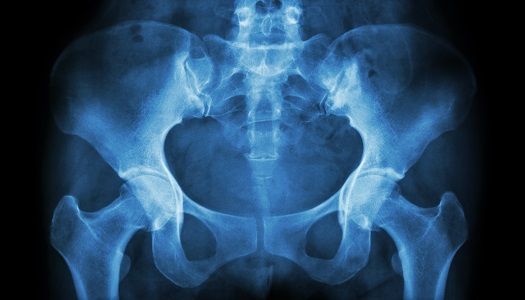Diet Can Counteract Bone-Damaging Inflammation in Women
Women might want to load up fruits and vegetables, for their bones' sake.

So-called “wear-and-tear” conditions—such as asthma, Crohn’s disease, and different types of arthritis—all have one thing in common: inflammation. Researchers have been putting more emphasis on keeping inflammation under control, whether that is through drugs or diet. Now, a study from The Ohio State University (OSU) is connecting anti-inflammatory diets with bone health.
Anti-inflammatory diets are typically filled with fruits, vegetables, beans, and whole grains. While everyone can benefit from consuming more of those types of foods, there’s a specific reason that postmenopausal women should stock up on them. Past research has linked bone loss and fracture risk with higher inflammatory milieu—and diet might be able to improve or worsen the chances of that happening. So a team from OSU dove deeper to see determine whether there is a cause and effect at work.
Using 160,191 women from the Women’s Health Initiative Observational Study and Clinical Trials, the researchers measured hip, lower arm, and total fracture risk in association with the dietary inflammatory index (DII)—which assesses a diet’s inflammatory potential. The participants ranged in age from 50 to 79 (average of 63) with no history of hip fracture. They were given inflammation scores based on 32 food components consumed within three months before the study began.
After six years of follow-up, data showed that the women following diets with the least inflammation-triggering foods lost less bone density than those with high inflammatory diets. This was true even though the women on the low inflammatory diets started off with lower bone density overall.
“These women with healthier diets didn’t lose bone as quickly as those with high-inflammation diets, and this is important because after menopause women see a drastic loss in bone density that contributes to fractures,” lead author, Tonya Orchard, PhD, an assistant professor of Human Nutrition at OSU, said in a news release.
DII scores were further analyzed to assess bone mineral density at after three and six years in a subgroup of 10,290 women. The average DII score improved significantly from baseline to the three-year mark, but that change didn’t impact fracture risk. DII score at baseline was only relevant in younger Caucasian women; any statistically significant association diminished for women over the age of 63 or those of any other race/ethnicity.
“By looking at the full diet rather than individual nutrients, these data provide a foundation for studying how components of the diet might interact to provide benefit and better inform women’s health and lifestyle choices,” added senior author, Rebecca Jackson, MD, director of OSU’s Center for Clinical and Translational Science.
The researchers acknowledged that a definite link can’t be confirmed from the data alone due to the fact that it was an observational study. However, the outcomes add to previously found evidence that increased inflammation can increase osteoporosis risk.
“This suggests that as women age, healthy diets are impacting their bones. I think this gives us yet another reason to support the recommendations for a healthy diet in the Dietary Guidelines for Americans,” Orchard concluded.
The study, “Dietary Inflammatory Index, Bone Mineral Density and Risk of Fracture in Postmenopausal Women: Results from the Women’s Health Initiative,” was published in the Journal of Bone and Mineral Research. The news release was provided by The Ohio State University.
Related Coverage:
Low Libido? Don’t Blame Contraceptive Pills